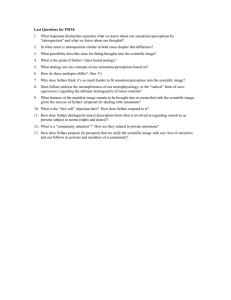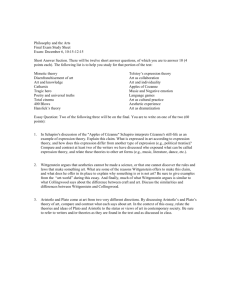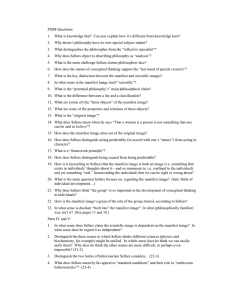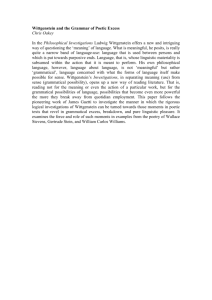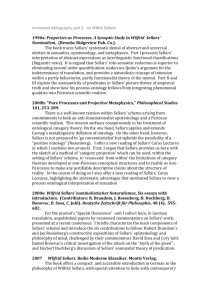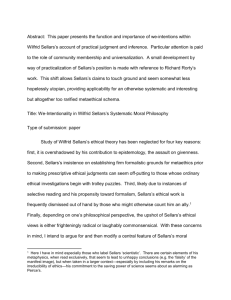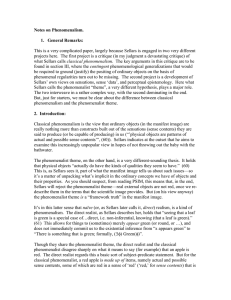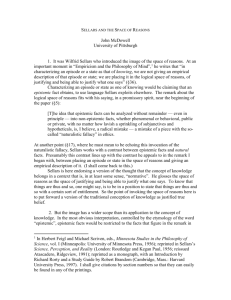Analytic Philosophy
advertisement
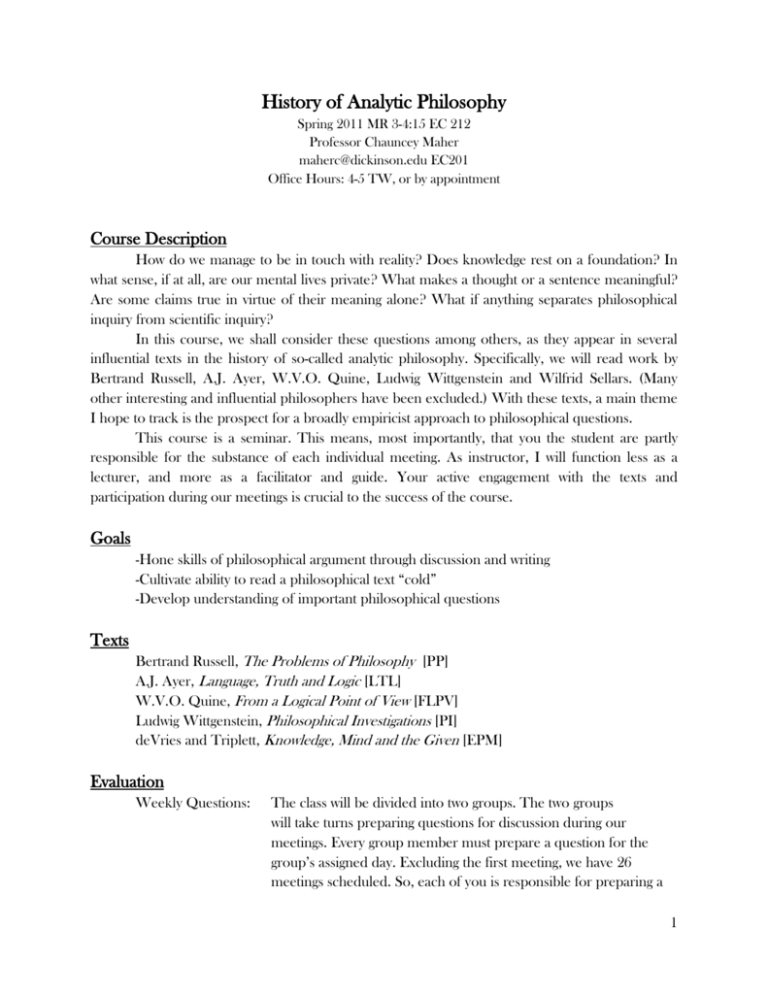
History of Analytic Philosophy Spring 2011 MR 3-4:15 EC 212 Professor Chauncey Maher maherc@dickinson.edu EC201 Office Hours: 4-5 TW, or by appointment Course Description How do we manage to be in touch with reality? Does knowledge rest on a foundation? In what sense, if at all, are our mental lives private? What makes a thought or a sentence meaningful? Are some claims true in virtue of their meaning alone? What if anything separates philosophical inquiry from scientific inquiry? In this course, we shall consider these questions among others, as they appear in several influential texts in the history of so-called analytic philosophy. Specifically, we will read work by Bertrand Russell, A.J. Ayer, W.V.O. Quine, Ludwig Wittgenstein and Wilfrid Sellars. (Many other interesting and influential philosophers have been excluded.) With these texts, a main theme I hope to track is the prospect for a broadly empiricist approach to philosophical questions. This course is a seminar. This means, most importantly, that you the student are partly responsible for the substance of each individual meeting. As instructor, I will function less as a lecturer, and more as a facilitator and guide. Your active engagement with the texts and participation during our meetings is crucial to the success of the course. Goals -Hone skills of philosophical argument through discussion and writing -Cultivate ability to read a philosophical text “cold” -Develop understanding of important philosophical questions Texts Bertrand Russell, The Problems of Philosophy [PP] A.J. Ayer, Language, Truth and Logic [LTL] W.V.O. Quine, From a Logical Point of View [FLPV] Ludwig Wittgenstein, Philosophical Investigations [PI] deVries and Triplett, Knowledge, Mind and the Given [EPM] Evaluation Weekly Questions: The class will be divided into two groups. The two groups will take turns preparing questions for discussion during our meetings. Every group member must prepare a question for the group’s assigned day. Excluding the first meeting, we have 26 meetings scheduled. So, each of you is responsible for preparing a 1 total of 13 questions. Your work on these questions is worth 15% of your final grade. (See the Guidelines below.) Discussion: In addition to preparing questions for every other meeting, you must also be responsive to the questions and claims of your peers. Your participation is worth 15% of your final grade. Essays: Essay 1: on Russell or Ayer 6 pages Due: 2/28 30% of your grade Essay 2: on Quine, Wittgenstein or Sellars 8-10 pages Outline Due: 5/5 Essay Due: 5/13 40% of your grade Guidelines for Questions Your questions are an essential part of this course. They will partly dictate what we spend time talking about in each of our meetings. Therefore, you should aim to prepare questions that you think are the most deserving of discussion. Bear in mind that formulating questions in a way that generates fruitful discussion is an acquired skill. In general, your questions should take one of two general forms: interpretive or critical. 1. Interpretive questions (E.g. “What does he mean?”) a. Identify a specific passage in the text. b. Say what you think it means c. State why it seems unclear 2. Critical questions (E.g. “Does he have good grounds for that?”) a. Identify a specific claim or argument in the text. b. Reconstruct the reasoning c. Say why it seems faulty Good questions can, of course, take other forms. 2 Schedule of Readings Date Topic Reading (for this day in class) Russell 1/24 M 1/27 R 1/31 M 2/3 2/7 M Introduction to the course Denoting Russell, “On Denoting” [Frege, “On Sense and Reference”] Reality, matter and idealism Russell, PP, I-IV Knowledge by acquaintance and by description Russell, PP, V-VI Universals Truth and knowledge Russell, PP, VII-X Russell, PP, XI-XV Ayer 2/10 Verificationism and the elimination of metaphysics 2/14 M 2/17 The a priori 2/21 M Emotivism in ethics 2/24 What is there? 2/28 M Internal and external questions Prospects for verificationism Ayer, LTL, chs.1-3 [Carnap, “The Overcoming of Metaphysics through the Logical Analysis of Language”] Ayer, LTL, chs. 4-5 Hempel, “Problems and Changes in the Empiricist Criterion of Meaning” Ayer, LTL, ch. 6 Geach, Ascriptivism [Stevenson, “Emotive Meaning of Ethical Terms”] Quine 3/3 3/7 M 3/10 3/14 M 3/17 Essay #1 Due Analyticity Reductionism and holism Quine, FLPV , “On What There Is” [Quine, “Logic and the Reification of Universals”] Carnap, “Empiricism, Semantics and Ontology” Essay #1 Due Quine, FLPV , “Two Dogmas of Empiricism” [Quine, “The Problem of Meaning in Linguistics”] Quine, FLPV , “Two Dogmas of Empiricism” NO CLASS SPRING BREAK NO CLASS SPRING BREAK SPRING BREAK SPRING BREAK 3 3/21 M Analyticity reconsidered Grice and Strawson, “In Defense of a Dogma” Wittgenstein 3/24 3/28 M 3/31 4/4 M 4/7 The Augustinian picture of language Following rules Wittgenstein, PI ,§§1-80 Wittgenstein, PI , §§81-242 Following rules Privacy and private language Wittgenstein, PI , §§81-242 Wittgenstein, PI , §§243-315 Expressing or reporting mental states; the nature of mental states; their relation to behavior Wittgenstein, PI , §§316-465 Sellars Sellars, EPM,§1 Sellars, “Realism and the New Way of Words,” §§1-2 C.I. Lewis, Mind and the World Order, chs. 1-2 [Schlick, General Theory of Knowledge, “The Nature of Knowledge”] Sellars, EPM,§§2-9 [Sellars, The Metaphysics of Epistemology, “Objects of Knowledge”] Sellars, EPM,§§10-29 4/11 M The Given 4/14 Sense data 4/18 M 4/21 Appearances, and impressions and ideas 4/25 M 4/28 Foundations of knowledge 5/2 M 5/5 Private episodes Sellars, EPM,§§39-55 Sellars, “Philosophy and the Scientific Image of Man” Sellars, EPM,§§56-63 (Slack) Essay #2 Outline Due Essay #2 Due by 2pm (Slack) Essay #2 Outline Due Essay #2 Due by 2pm 5/13 Meaning Philosophy and the scientific image of man Sellars, EPM,§§30-31 Sellars, The Metaphysics of Epistemology, “Concept Empiricism” [Sellars, “Some Reflections on Language Games”] [Sellars, “Meaning as Functional Classification”] Sellars, EPM,§§32-38 Schlick, “The Foundation of Knowledge” 4 5 Academic Honesty Any case of suspected academic dishonesty must be reported. Note: “To plagiarize is to use without proper citation or acknowledgment the words, ideas, or work of another. Plagiarism is a form of cheating that refers to several types of unacknowledged borrowing.” When in doubt, cite it. For more information, please see the handbook on Community Standards here: http://www.dickinson.edu/student/files/commstand0809.pdf Disabilities In compliance with the Dickinson College policy and equal access laws, I am available to discuss requests made by students with disabilities for academic accommodations. Such requests must be verified in advance this semester by Marni Jones, Coordinator of Disability Services, who will provide a signed copy of an accommodation letter. This must be presented in a scheduled meeting with me prior to any accommodations being offered. Requests for academic accommodations should be made during the first three weeks of the semester (except for unusual circumstances) so that timely and appropriate arrangements can be made. Students requesting accommodations are required to register with Disability Services, located in Academic Advising, first floor of Biddle House (contact ext. 1080 or jonesmar@dickinson.edu) to verify their eligibility for reasonable and appropriate accommodations. 6
